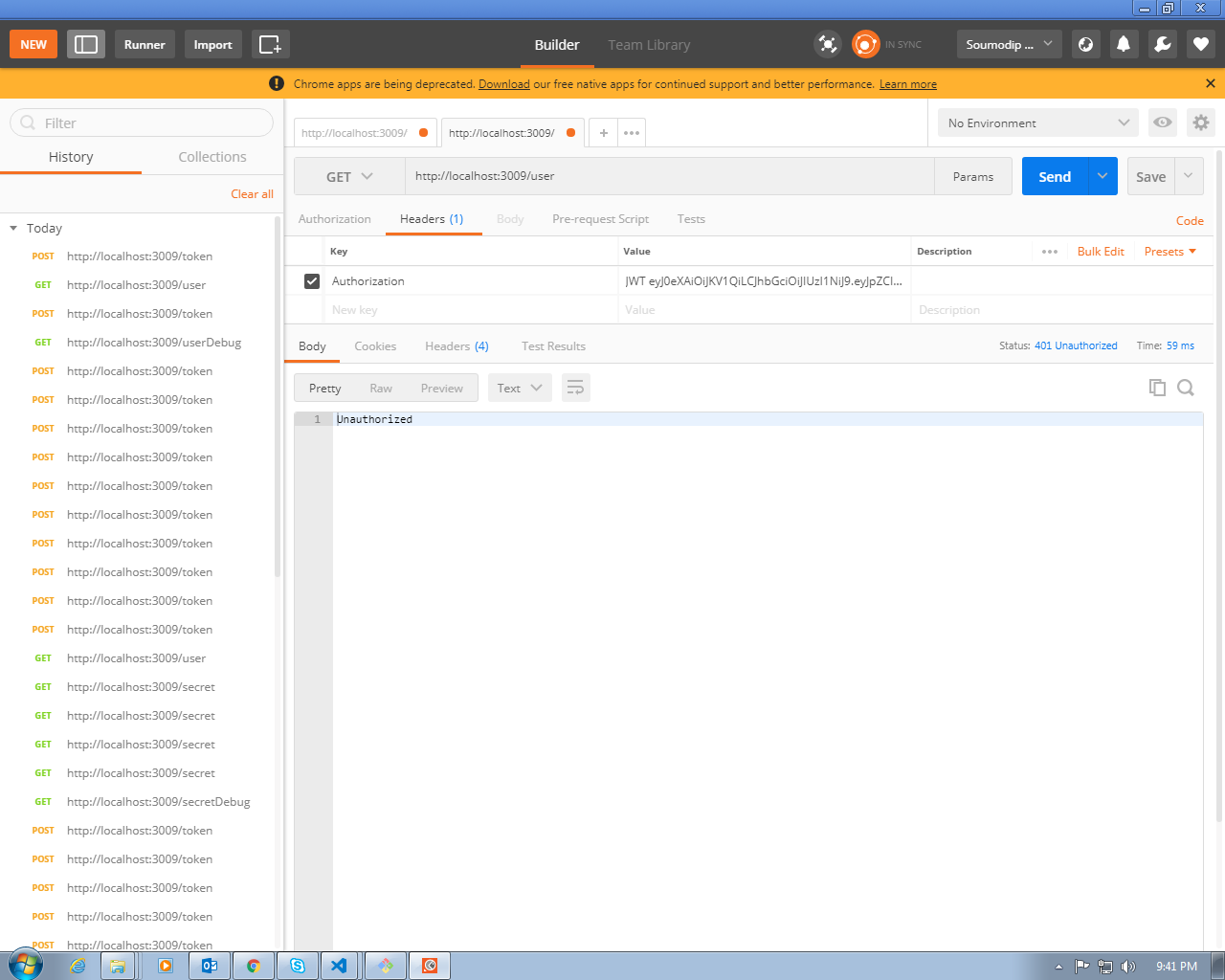Created
October 22, 2016 15:07
-
-
Save JonathanMH/6bd82c0954fb8f21a837ce281da4265a to your computer and use it in GitHub Desktop.
JSON Web Token Tutorial: Express
This file contains hidden or bidirectional Unicode text that may be interpreted or compiled differently than what appears below. To review, open the file in an editor that reveals hidden Unicode characters.
Learn more about bidirectional Unicode characters
| // file: index.js | |
| var _ = require("lodash"); | |
| var express = require("express"); | |
| var bodyParser = require("body-parser"); | |
| var jwt = require('jsonwebtoken'); | |
| var passport = require("passport"); | |
| var passportJWT = require("passport-jwt"); | |
| var ExtractJwt = passportJWT.ExtractJwt; | |
| var JwtStrategy = passportJWT.Strategy; | |
| var users = [ | |
| { | |
| id: 1, | |
| name: 'jonathanmh', | |
| password: '%2yx4' | |
| }, | |
| { | |
| id: 2, | |
| name: 'test', | |
| password: 'test' | |
| } | |
| ]; | |
| var jwtOptions = {} | |
| jwtOptions.jwtFromRequest = ExtractJwt.fromAuthHeader(); | |
| jwtOptions.secretOrKey = 'tasmanianDevil'; | |
| var strategy = new JwtStrategy(jwtOptions, function(jwt_payload, next) { | |
| console.log('payload received', jwt_payload); | |
| // usually this would be a database call: | |
| var user = users[_.findIndex(users, {id: jwt_payload.id})]; | |
| if (user) { | |
| next(null, user); | |
| } else { | |
| next(null, false); | |
| } | |
| }); | |
| passport.use(strategy); | |
| var app = express(); | |
| app.use(passport.initialize()); | |
| // parse application/x-www-form-urlencoded | |
| // for easier testing with Postman or plain HTML forms | |
| app.use(bodyParser.urlencoded({ | |
| extended: true | |
| })); | |
| // parse application/json | |
| app.use(bodyParser.json()) | |
| app.get("/", function(req, res) { | |
| res.json({message: "Express is up!"}); | |
| }); | |
| app.post("/login", function(req, res) { | |
| if(req.body.name && req.body.password){ | |
| var name = req.body.name; | |
| var password = req.body.password; | |
| } | |
| // usually this would be a database call: | |
| var user = users[_.findIndex(users, {name: name})]; | |
| if( ! user ){ | |
| res.status(401).json({message:"no such user found"}); | |
| } | |
| if(user.password === req.body.password) { | |
| // from now on we'll identify the user by the id and the id is the only personalized value that goes into our token | |
| var payload = {id: user.id}; | |
| var token = jwt.sign(payload, jwtOptions.secretOrKey); | |
| res.json({message: "ok", token: token}); | |
| } else { | |
| res.status(401).json({message:"passwords did not match"}); | |
| } | |
| }); | |
| app.get("/secret", passport.authenticate('jwt', { session: false }), function(req, res){ | |
| res.json({message: "Success! You can not see this without a token"}); | |
| }); | |
| app.get("/secretDebug", | |
| function(req, res, next){ | |
| console.log(req.get('Authorization')); | |
| next(); | |
| }, function(req, res){ | |
| res.json("debugging"); | |
| }); | |
| app.listen(3000, function() { | |
| console.log("Express running"); | |
| }); |
This file contains hidden or bidirectional Unicode text that may be interpreted or compiled differently than what appears below. To review, open the file in an editor that reveals hidden Unicode characters.
Learn more about bidirectional Unicode characters
| { | |
| "name": "jwt-tutorial", | |
| "version": "1.0.0", | |
| "description": "", | |
| "main": "index.js", | |
| "scripts": { | |
| "test": "echo \"Error: no test specified\" && exit 1" | |
| }, | |
| "keywords": [], | |
| "author": "", | |
| "license": "ISC", | |
| "dependencies": { | |
| "body-parser": "^1.15.2", | |
| "express": "^4.14.0", | |
| "jsonwebtoken": "^7.1.9", | |
| "lodash": "^4.16.4", | |
| "passport": "^0.3.2", | |
| "passport-jwt": "^2.1.0" | |
| } | |
| } |
Hello everyone. I still have this issue. Tried using bearer strategy too. Here is the link to my repo https://github.com/soumodips/JWT-passport-OAuth
I will be glad if any one can help.
Thanks a ton in advance!
ISSUE SOLVED:
Be sure to use all key names as expected by the modules. I had used 'exp' for expiry time in the payload instead of 'expiresIn'. Enjoy!!
Thanks
Here, I fixed his code:
https://gist.github.com/ianfabs/7d2e8dca8e4e131463b5cdd6a2c537c5
These 2 ways worked for me:
ExtractJwt.fromAuthHeaderWithScheme('bearer') or with ('jwt');
Headers: Authorization: bearer + token or jwt + token
Very helpful! Thanks
Sign up for free
to join this conversation on GitHub.
Already have an account?
Sign in to comment


@wisetc I used this instead
jwtOptions.jwtFromRequest = ExtractJwt.fromAuthHeaderWithScheme('bearer');